Climate Change and its Impact on Business
VerifiedAdded on 2022/08/26
|14
|2723
|11
AI Summary
Contribute Materials
Your contribution can guide someone’s learning journey. Share your
documents today.

Secure Best Marks with AI Grader
Need help grading? Try our AI Grader for instant feedback on your assignments.
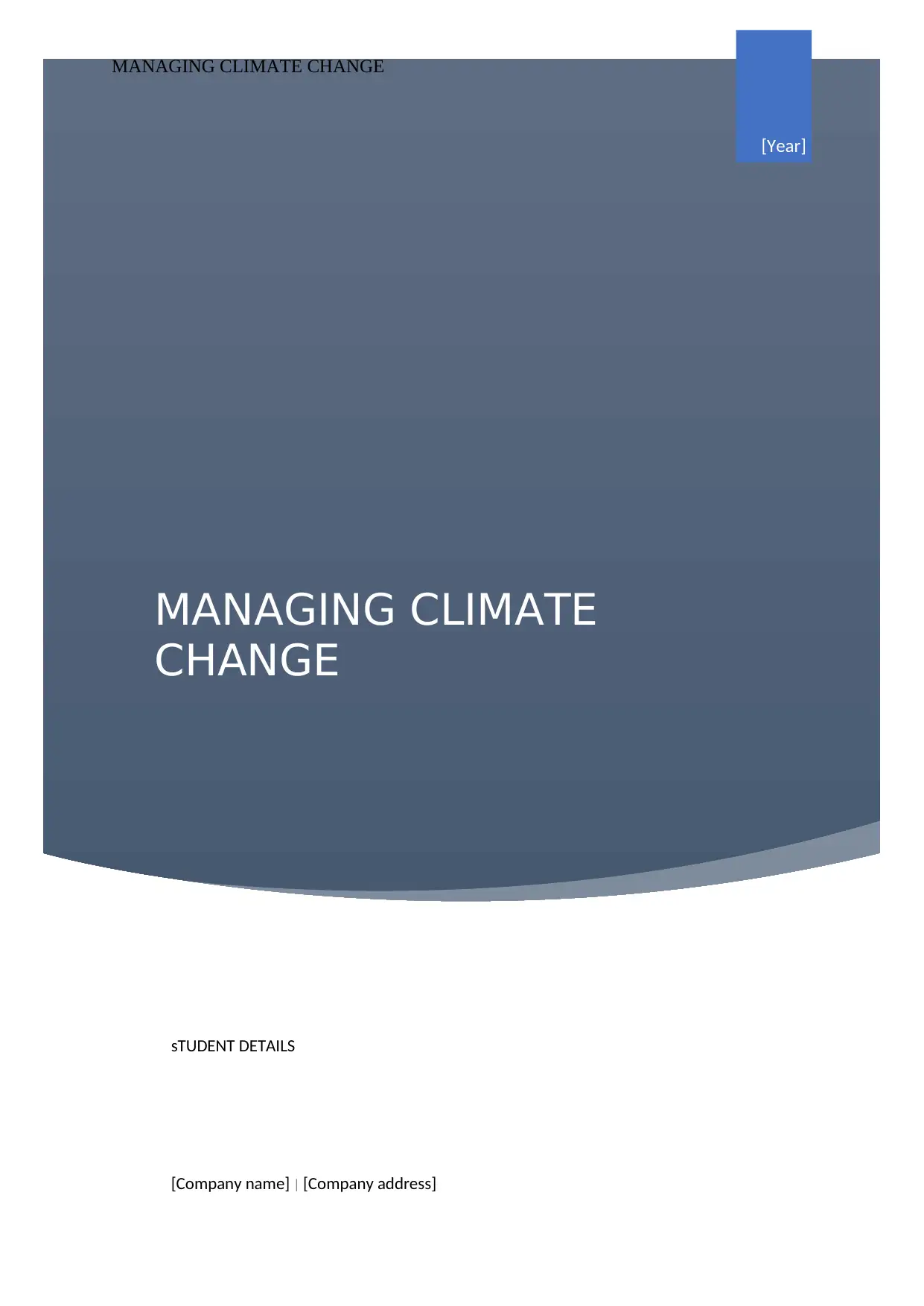
MANAGING CLIMATE
CHANGE
MANAGING CLIMATE CHANGE 1 | P a g e
[Year]
sTUDENT DETAILS
[Company name] | [Company address]
CHANGE
MANAGING CLIMATE CHANGE 1 | P a g e
[Year]
sTUDENT DETAILS
[Company name] | [Company address]
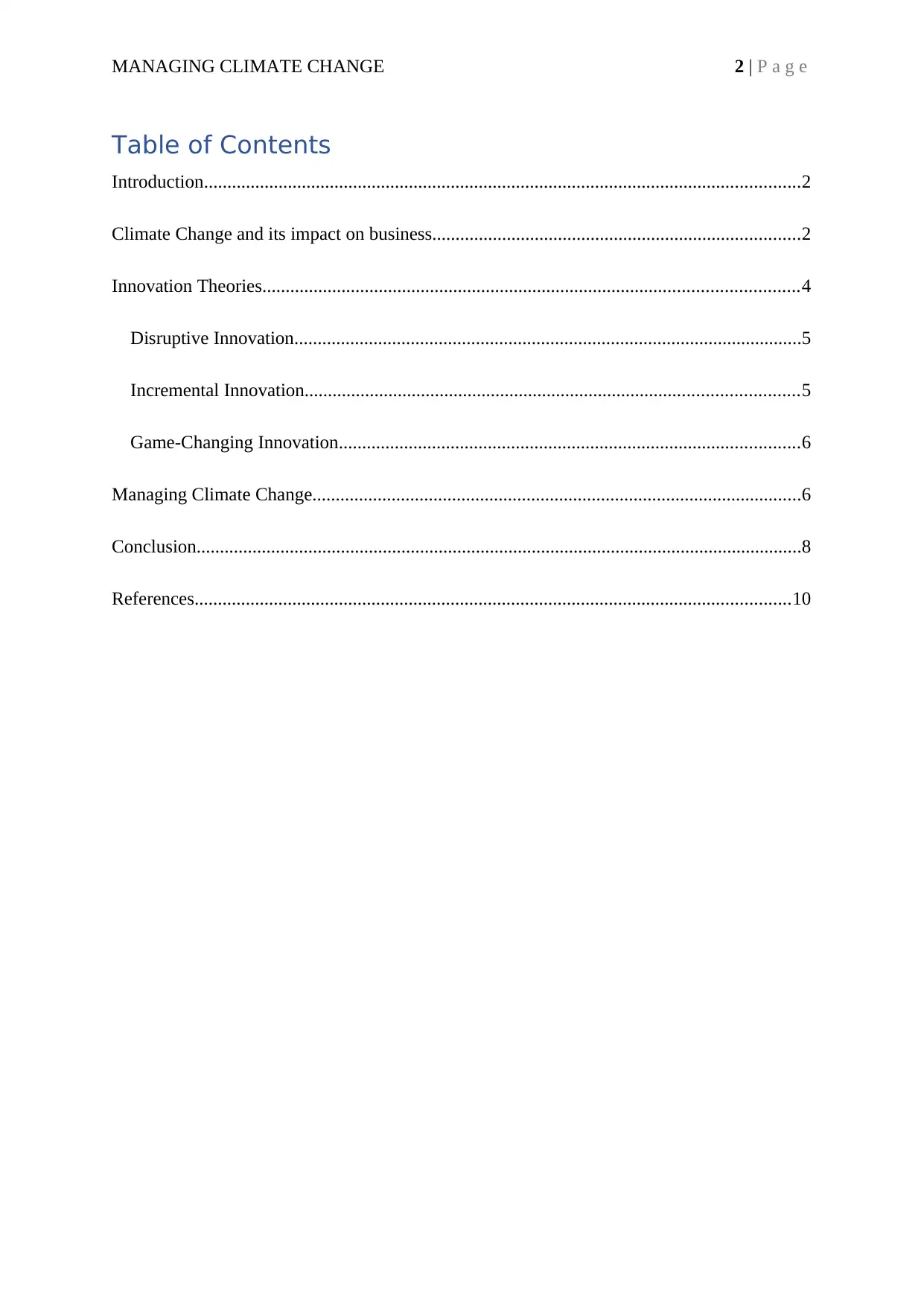
MANAGING CLIMATE CHANGE 2 | P a g e
Table of Contents
Introduction................................................................................................................................2
Climate Change and its impact on business...............................................................................2
Innovation Theories...................................................................................................................4
Disruptive Innovation.............................................................................................................5
Incremental Innovation..........................................................................................................5
Game-Changing Innovation...................................................................................................6
Managing Climate Change.........................................................................................................6
Conclusion..................................................................................................................................8
References................................................................................................................................10
Table of Contents
Introduction................................................................................................................................2
Climate Change and its impact on business...............................................................................2
Innovation Theories...................................................................................................................4
Disruptive Innovation.............................................................................................................5
Incremental Innovation..........................................................................................................5
Game-Changing Innovation...................................................................................................6
Managing Climate Change.........................................................................................................6
Conclusion..................................................................................................................................8
References................................................................................................................................10
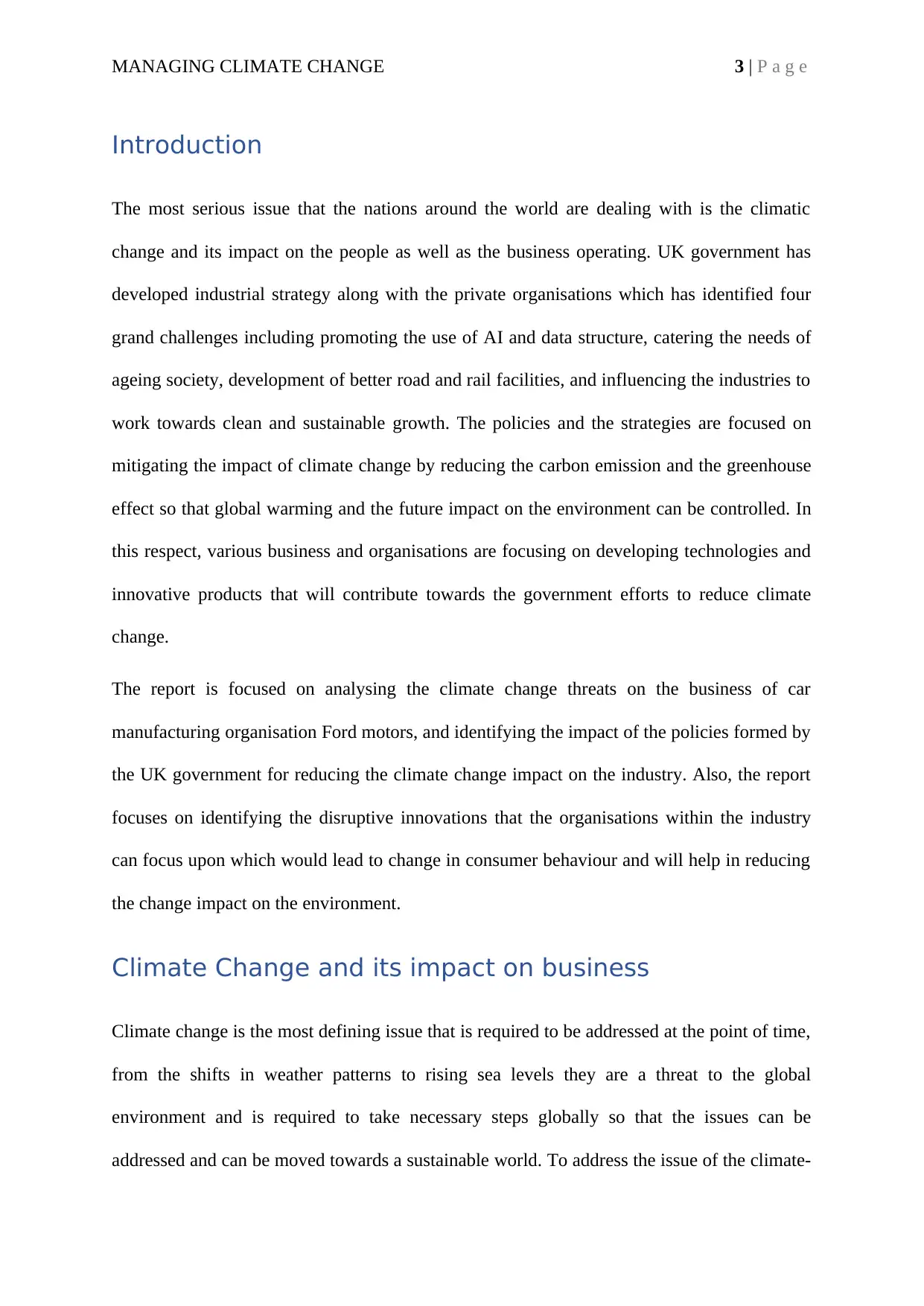
MANAGING CLIMATE CHANGE 3 | P a g e
Introduction
The most serious issue that the nations around the world are dealing with is the climatic
change and its impact on the people as well as the business operating. UK government has
developed industrial strategy along with the private organisations which has identified four
grand challenges including promoting the use of AI and data structure, catering the needs of
ageing society, development of better road and rail facilities, and influencing the industries to
work towards clean and sustainable growth. The policies and the strategies are focused on
mitigating the impact of climate change by reducing the carbon emission and the greenhouse
effect so that global warming and the future impact on the environment can be controlled. In
this respect, various business and organisations are focusing on developing technologies and
innovative products that will contribute towards the government efforts to reduce climate
change.
The report is focused on analysing the climate change threats on the business of car
manufacturing organisation Ford motors, and identifying the impact of the policies formed by
the UK government for reducing the climate change impact on the industry. Also, the report
focuses on identifying the disruptive innovations that the organisations within the industry
can focus upon which would lead to change in consumer behaviour and will help in reducing
the change impact on the environment.
Climate Change and its impact on business
Climate change is the most defining issue that is required to be addressed at the point of time,
from the shifts in weather patterns to rising sea levels they are a threat to the global
environment and is required to take necessary steps globally so that the issues can be
addressed and can be moved towards a sustainable world. To address the issue of the climate-
Introduction
The most serious issue that the nations around the world are dealing with is the climatic
change and its impact on the people as well as the business operating. UK government has
developed industrial strategy along with the private organisations which has identified four
grand challenges including promoting the use of AI and data structure, catering the needs of
ageing society, development of better road and rail facilities, and influencing the industries to
work towards clean and sustainable growth. The policies and the strategies are focused on
mitigating the impact of climate change by reducing the carbon emission and the greenhouse
effect so that global warming and the future impact on the environment can be controlled. In
this respect, various business and organisations are focusing on developing technologies and
innovative products that will contribute towards the government efforts to reduce climate
change.
The report is focused on analysing the climate change threats on the business of car
manufacturing organisation Ford motors, and identifying the impact of the policies formed by
the UK government for reducing the climate change impact on the industry. Also, the report
focuses on identifying the disruptive innovations that the organisations within the industry
can focus upon which would lead to change in consumer behaviour and will help in reducing
the change impact on the environment.
Climate Change and its impact on business
Climate change is the most defining issue that is required to be addressed at the point of time,
from the shifts in weather patterns to rising sea levels they are a threat to the global
environment and is required to take necessary steps globally so that the issues can be
addressed and can be moved towards a sustainable world. To address the issue of the climate-
Secure Best Marks with AI Grader
Need help grading? Try our AI Grader for instant feedback on your assignments.
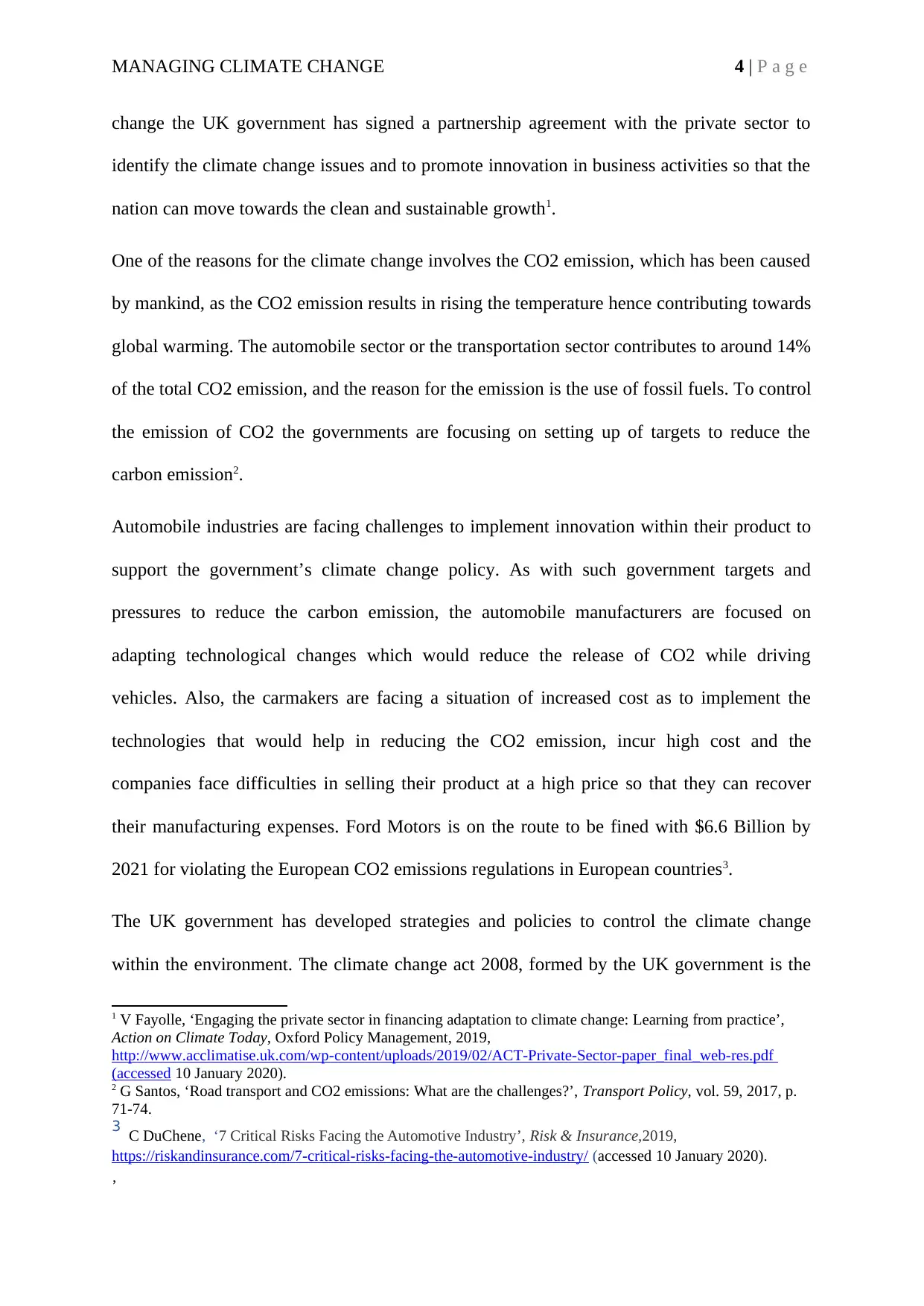
MANAGING CLIMATE CHANGE 4 | P a g e
change the UK government has signed a partnership agreement with the private sector to
identify the climate change issues and to promote innovation in business activities so that the
nation can move towards the clean and sustainable growth1.
One of the reasons for the climate change involves the CO2 emission, which has been caused
by mankind, as the CO2 emission results in rising the temperature hence contributing towards
global warming. The automobile sector or the transportation sector contributes to around 14%
of the total CO2 emission, and the reason for the emission is the use of fossil fuels. To control
the emission of CO2 the governments are focusing on setting up of targets to reduce the
carbon emission2.
Automobile industries are facing challenges to implement innovation within their product to
support the government’s climate change policy. As with such government targets and
pressures to reduce the carbon emission, the automobile manufacturers are focused on
adapting technological changes which would reduce the release of CO2 while driving
vehicles. Also, the carmakers are facing a situation of increased cost as to implement the
technologies that would help in reducing the CO2 emission, incur high cost and the
companies face difficulties in selling their product at a high price so that they can recover
their manufacturing expenses. Ford Motors is on the route to be fined with $6.6 Billion by
2021 for violating the European CO2 emissions regulations in European countries3.
The UK government has developed strategies and policies to control the climate change
within the environment. The climate change act 2008, formed by the UK government is the
1 V Fayolle, ‘Engaging the private sector in financing adaptation to climate change: Learning from practice’,
Action on Climate Today, Oxford Policy Management, 2019,
http://www.acclimatise.uk.com/wp-content/uploads/2019/02/ACT-Private-Sector-paper_final_web-res.pdf
(accessed 10 January 2020).
2 G Santos, ‘Road transport and CO2 emissions: What are the challenges?’, Transport Policy, vol. 59, 2017, p.
71-74.
3 C DuChene, ‘7 Critical Risks Facing the Automotive Industry’, Risk & Insurance,2019,
https://riskandinsurance.com/7-critical-risks-facing-the-automotive-industry/ (accessed 10 January 2020).
’
change the UK government has signed a partnership agreement with the private sector to
identify the climate change issues and to promote innovation in business activities so that the
nation can move towards the clean and sustainable growth1.
One of the reasons for the climate change involves the CO2 emission, which has been caused
by mankind, as the CO2 emission results in rising the temperature hence contributing towards
global warming. The automobile sector or the transportation sector contributes to around 14%
of the total CO2 emission, and the reason for the emission is the use of fossil fuels. To control
the emission of CO2 the governments are focusing on setting up of targets to reduce the
carbon emission2.
Automobile industries are facing challenges to implement innovation within their product to
support the government’s climate change policy. As with such government targets and
pressures to reduce the carbon emission, the automobile manufacturers are focused on
adapting technological changes which would reduce the release of CO2 while driving
vehicles. Also, the carmakers are facing a situation of increased cost as to implement the
technologies that would help in reducing the CO2 emission, incur high cost and the
companies face difficulties in selling their product at a high price so that they can recover
their manufacturing expenses. Ford Motors is on the route to be fined with $6.6 Billion by
2021 for violating the European CO2 emissions regulations in European countries3.
The UK government has developed strategies and policies to control the climate change
within the environment. The climate change act 2008, formed by the UK government is the
1 V Fayolle, ‘Engaging the private sector in financing adaptation to climate change: Learning from practice’,
Action on Climate Today, Oxford Policy Management, 2019,
http://www.acclimatise.uk.com/wp-content/uploads/2019/02/ACT-Private-Sector-paper_final_web-res.pdf
(accessed 10 January 2020).
2 G Santos, ‘Road transport and CO2 emissions: What are the challenges?’, Transport Policy, vol. 59, 2017, p.
71-74.
3 C DuChene, ‘7 Critical Risks Facing the Automotive Industry’, Risk & Insurance,2019,
https://riskandinsurance.com/7-critical-risks-facing-the-automotive-industry/ (accessed 10 January 2020).
’
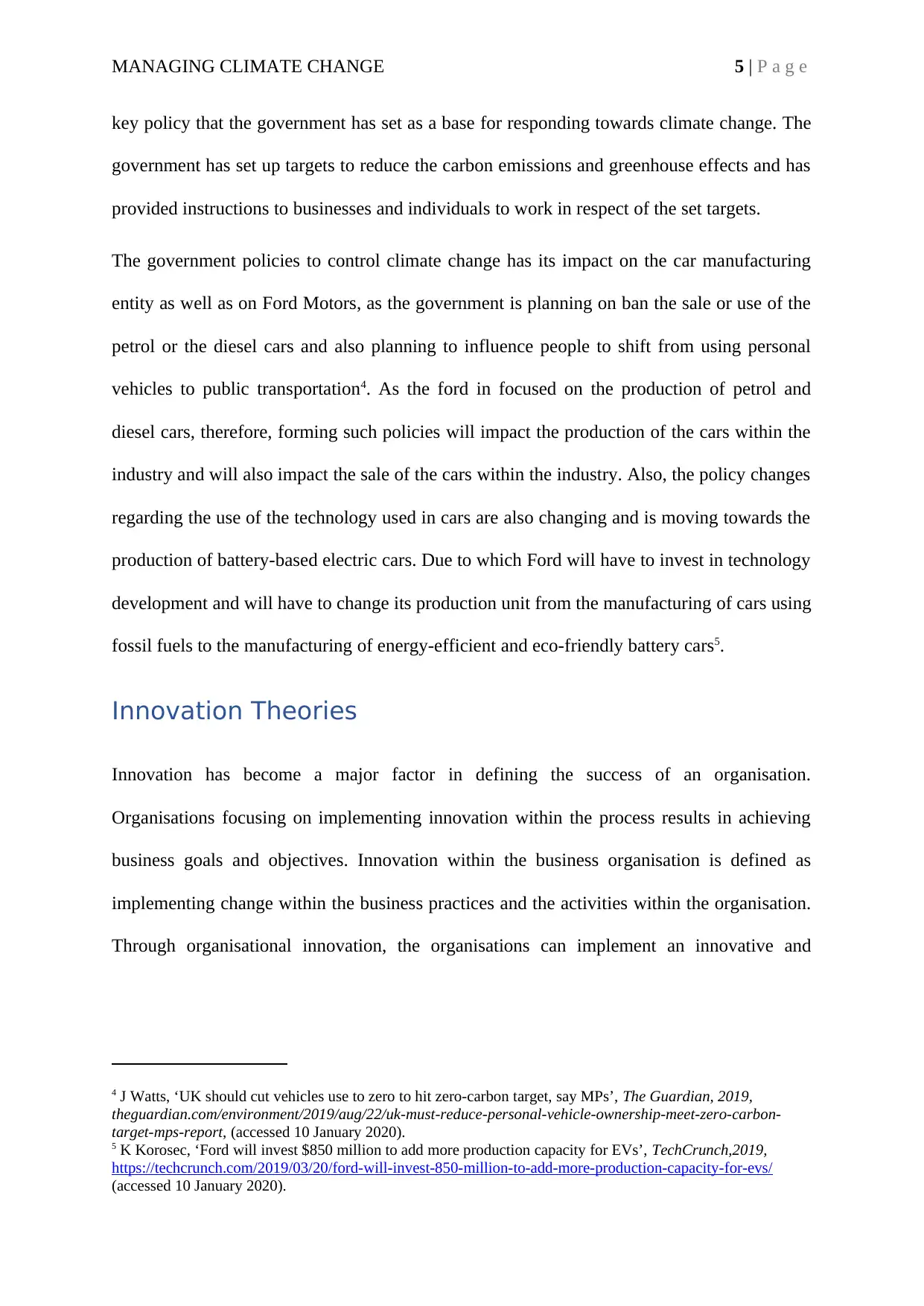
MANAGING CLIMATE CHANGE 5 | P a g e
key policy that the government has set as a base for responding towards climate change. The
government has set up targets to reduce the carbon emissions and greenhouse effects and has
provided instructions to businesses and individuals to work in respect of the set targets.
The government policies to control climate change has its impact on the car manufacturing
entity as well as on Ford Motors, as the government is planning on ban the sale or use of the
petrol or the diesel cars and also planning to influence people to shift from using personal
vehicles to public transportation4. As the ford in focused on the production of petrol and
diesel cars, therefore, forming such policies will impact the production of the cars within the
industry and will also impact the sale of the cars within the industry. Also, the policy changes
regarding the use of the technology used in cars are also changing and is moving towards the
production of battery-based electric cars. Due to which Ford will have to invest in technology
development and will have to change its production unit from the manufacturing of cars using
fossil fuels to the manufacturing of energy-efficient and eco-friendly battery cars5.
Innovation Theories
Innovation has become a major factor in defining the success of an organisation.
Organisations focusing on implementing innovation within the process results in achieving
business goals and objectives. Innovation within the business organisation is defined as
implementing change within the business practices and the activities within the organisation.
Through organisational innovation, the organisations can implement an innovative and
4 J Watts, ‘UK should cut vehicles use to zero to hit zero-carbon target, say MPs’, The Guardian, 2019,
theguardian.com/environment/2019/aug/22/uk-must-reduce-personal-vehicle-ownership-meet-zero-carbon-
target-mps-report, (accessed 10 January 2020).
5 K Korosec, ‘Ford will invest $850 million to add more production capacity for EVs’, TechCrunch,2019,
https://techcrunch.com/2019/03/20/ford-will-invest-850-million-to-add-more-production-capacity-for-evs/
(accessed 10 January 2020).
key policy that the government has set as a base for responding towards climate change. The
government has set up targets to reduce the carbon emissions and greenhouse effects and has
provided instructions to businesses and individuals to work in respect of the set targets.
The government policies to control climate change has its impact on the car manufacturing
entity as well as on Ford Motors, as the government is planning on ban the sale or use of the
petrol or the diesel cars and also planning to influence people to shift from using personal
vehicles to public transportation4. As the ford in focused on the production of petrol and
diesel cars, therefore, forming such policies will impact the production of the cars within the
industry and will also impact the sale of the cars within the industry. Also, the policy changes
regarding the use of the technology used in cars are also changing and is moving towards the
production of battery-based electric cars. Due to which Ford will have to invest in technology
development and will have to change its production unit from the manufacturing of cars using
fossil fuels to the manufacturing of energy-efficient and eco-friendly battery cars5.
Innovation Theories
Innovation has become a major factor in defining the success of an organisation.
Organisations focusing on implementing innovation within the process results in achieving
business goals and objectives. Innovation within the business organisation is defined as
implementing change within the business practices and the activities within the organisation.
Through organisational innovation, the organisations can implement an innovative and
4 J Watts, ‘UK should cut vehicles use to zero to hit zero-carbon target, say MPs’, The Guardian, 2019,
theguardian.com/environment/2019/aug/22/uk-must-reduce-personal-vehicle-ownership-meet-zero-carbon-
target-mps-report, (accessed 10 January 2020).
5 K Korosec, ‘Ford will invest $850 million to add more production capacity for EVs’, TechCrunch,2019,
https://techcrunch.com/2019/03/20/ford-will-invest-850-million-to-add-more-production-capacity-for-evs/
(accessed 10 January 2020).
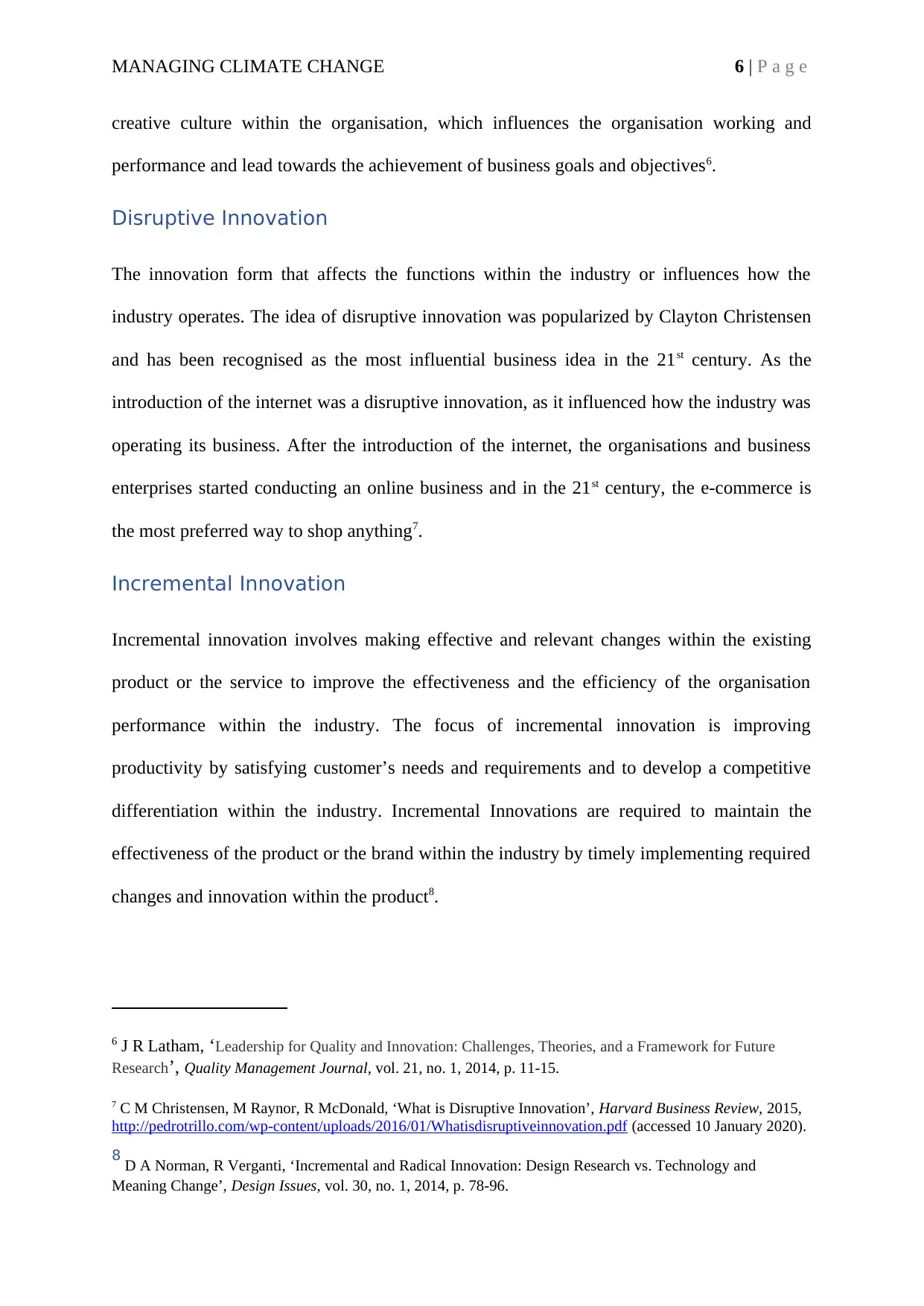
MANAGING CLIMATE CHANGE 6 | P a g e
creative culture within the organisation, which influences the organisation working and
performance and lead towards the achievement of business goals and objectives6.
Disruptive Innovation
The innovation form that affects the functions within the industry or influences how the
industry operates. The idea of disruptive innovation was popularized by Clayton Christensen
and has been recognised as the most influential business idea in the 21st century. As the
introduction of the internet was a disruptive innovation, as it influenced how the industry was
operating its business. After the introduction of the internet, the organisations and business
enterprises started conducting an online business and in the 21st century, the e-commerce is
the most preferred way to shop anything7.
Incremental Innovation
Incremental innovation involves making effective and relevant changes within the existing
product or the service to improve the effectiveness and the efficiency of the organisation
performance within the industry. The focus of incremental innovation is improving
productivity by satisfying customer’s needs and requirements and to develop a competitive
differentiation within the industry. Incremental Innovations are required to maintain the
effectiveness of the product or the brand within the industry by timely implementing required
changes and innovation within the product8.
6 J R Latham, ‘Leadership for Quality and Innovation: Challenges, Theories, and a Framework for Future
Research’, Quality Management Journal, vol. 21, no. 1, 2014, p. 11-15.
7 C M Christensen, M Raynor, R McDonald, ‘What is Disruptive Innovation’, Harvard Business Review, 2015,
http://pedrotrillo.com/wp-content/uploads/2016/01/Whatisdisruptiveinnovation.pdf (accessed 10 January 2020).
8 D A Norman, R Verganti, ‘Incremental and Radical Innovation: Design Research vs. Technology and
Meaning Change’, Design Issues, vol. 30, no. 1, 2014, p. 78-96.
creative culture within the organisation, which influences the organisation working and
performance and lead towards the achievement of business goals and objectives6.
Disruptive Innovation
The innovation form that affects the functions within the industry or influences how the
industry operates. The idea of disruptive innovation was popularized by Clayton Christensen
and has been recognised as the most influential business idea in the 21st century. As the
introduction of the internet was a disruptive innovation, as it influenced how the industry was
operating its business. After the introduction of the internet, the organisations and business
enterprises started conducting an online business and in the 21st century, the e-commerce is
the most preferred way to shop anything7.
Incremental Innovation
Incremental innovation involves making effective and relevant changes within the existing
product or the service to improve the effectiveness and the efficiency of the organisation
performance within the industry. The focus of incremental innovation is improving
productivity by satisfying customer’s needs and requirements and to develop a competitive
differentiation within the industry. Incremental Innovations are required to maintain the
effectiveness of the product or the brand within the industry by timely implementing required
changes and innovation within the product8.
6 J R Latham, ‘Leadership for Quality and Innovation: Challenges, Theories, and a Framework for Future
Research’, Quality Management Journal, vol. 21, no. 1, 2014, p. 11-15.
7 C M Christensen, M Raynor, R McDonald, ‘What is Disruptive Innovation’, Harvard Business Review, 2015,
http://pedrotrillo.com/wp-content/uploads/2016/01/Whatisdisruptiveinnovation.pdf (accessed 10 January 2020).
8 D A Norman, R Verganti, ‘Incremental and Radical Innovation: Design Research vs. Technology and
Meaning Change’, Design Issues, vol. 30, no. 1, 2014, p. 78-96.
Paraphrase This Document
Need a fresh take? Get an instant paraphrase of this document with our AI Paraphraser
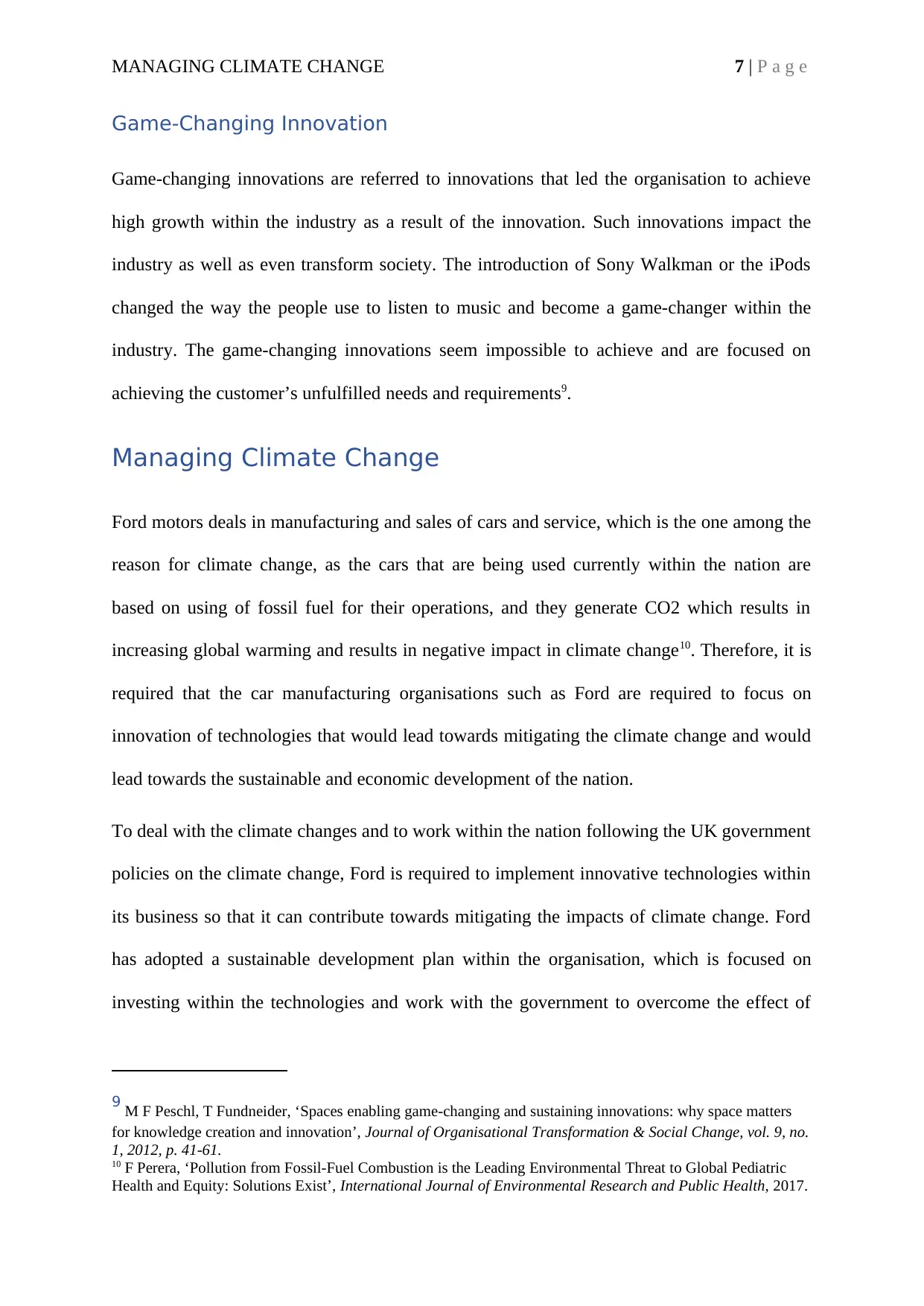
MANAGING CLIMATE CHANGE 7 | P a g e
Game-Changing Innovation
Game-changing innovations are referred to innovations that led the organisation to achieve
high growth within the industry as a result of the innovation. Such innovations impact the
industry as well as even transform society. The introduction of Sony Walkman or the iPods
changed the way the people use to listen to music and become a game-changer within the
industry. The game-changing innovations seem impossible to achieve and are focused on
achieving the customer’s unfulfilled needs and requirements9.
Managing Climate Change
Ford motors deals in manufacturing and sales of cars and service, which is the one among the
reason for climate change, as the cars that are being used currently within the nation are
based on using of fossil fuel for their operations, and they generate CO2 which results in
increasing global warming and results in negative impact in climate change10. Therefore, it is
required that the car manufacturing organisations such as Ford are required to focus on
innovation of technologies that would lead towards mitigating the climate change and would
lead towards the sustainable and economic development of the nation.
To deal with the climate changes and to work within the nation following the UK government
policies on the climate change, Ford is required to implement innovative technologies within
its business so that it can contribute towards mitigating the impacts of climate change. Ford
has adopted a sustainable development plan within the organisation, which is focused on
investing within the technologies and work with the government to overcome the effect of
9 M F Peschl, T Fundneider, ‘Spaces enabling game-changing and sustaining innovations: why space matters
for knowledge creation and innovation’, Journal of Organisational Transformation & Social Change, vol. 9, no.
1, 2012, p. 41-61.
10 F Perera, ‘Pollution from Fossil-Fuel Combustion is the Leading Environmental Threat to Global Pediatric
Health and Equity: Solutions Exist’, International Journal of Environmental Research and Public Health, 2017.
Game-Changing Innovation
Game-changing innovations are referred to innovations that led the organisation to achieve
high growth within the industry as a result of the innovation. Such innovations impact the
industry as well as even transform society. The introduction of Sony Walkman or the iPods
changed the way the people use to listen to music and become a game-changer within the
industry. The game-changing innovations seem impossible to achieve and are focused on
achieving the customer’s unfulfilled needs and requirements9.
Managing Climate Change
Ford motors deals in manufacturing and sales of cars and service, which is the one among the
reason for climate change, as the cars that are being used currently within the nation are
based on using of fossil fuel for their operations, and they generate CO2 which results in
increasing global warming and results in negative impact in climate change10. Therefore, it is
required that the car manufacturing organisations such as Ford are required to focus on
innovation of technologies that would lead towards mitigating the climate change and would
lead towards the sustainable and economic development of the nation.
To deal with the climate changes and to work within the nation following the UK government
policies on the climate change, Ford is required to implement innovative technologies within
its business so that it can contribute towards mitigating the impacts of climate change. Ford
has adopted a sustainable development plan within the organisation, which is focused on
investing within the technologies and work with the government to overcome the effect of
9 M F Peschl, T Fundneider, ‘Spaces enabling game-changing and sustaining innovations: why space matters
for knowledge creation and innovation’, Journal of Organisational Transformation & Social Change, vol. 9, no.
1, 2012, p. 41-61.
10 F Perera, ‘Pollution from Fossil-Fuel Combustion is the Leading Environmental Threat to Global Pediatric
Health and Equity: Solutions Exist’, International Journal of Environmental Research and Public Health, 2017.
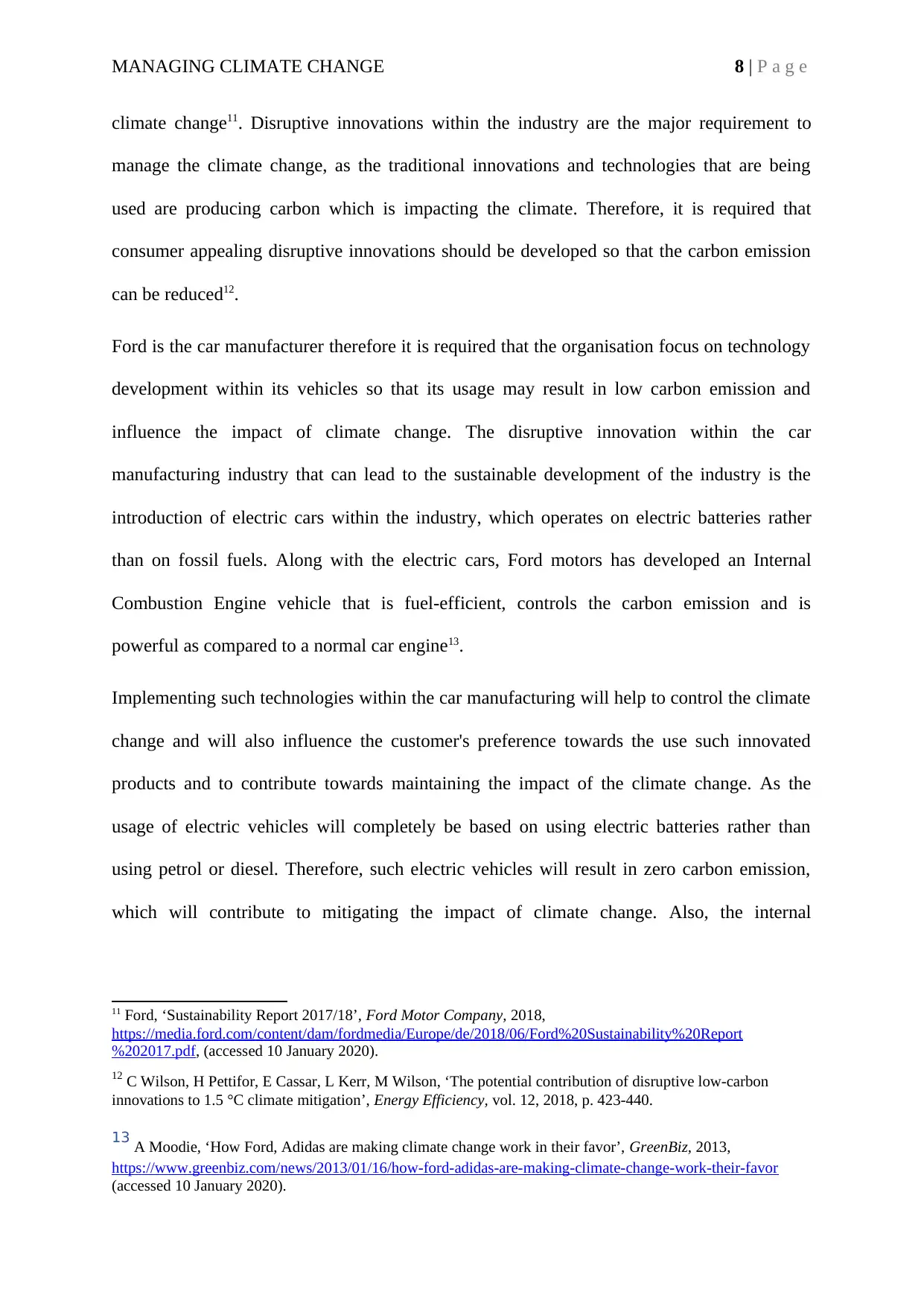
MANAGING CLIMATE CHANGE 8 | P a g e
climate change11. Disruptive innovations within the industry are the major requirement to
manage the climate change, as the traditional innovations and technologies that are being
used are producing carbon which is impacting the climate. Therefore, it is required that
consumer appealing disruptive innovations should be developed so that the carbon emission
can be reduced12.
Ford is the car manufacturer therefore it is required that the organisation focus on technology
development within its vehicles so that its usage may result in low carbon emission and
influence the impact of climate change. The disruptive innovation within the car
manufacturing industry that can lead to the sustainable development of the industry is the
introduction of electric cars within the industry, which operates on electric batteries rather
than on fossil fuels. Along with the electric cars, Ford motors has developed an Internal
Combustion Engine vehicle that is fuel-efficient, controls the carbon emission and is
powerful as compared to a normal car engine13.
Implementing such technologies within the car manufacturing will help to control the climate
change and will also influence the customer's preference towards the use such innovated
products and to contribute towards maintaining the impact of the climate change. As the
usage of electric vehicles will completely be based on using electric batteries rather than
using petrol or diesel. Therefore, such electric vehicles will result in zero carbon emission,
which will contribute to mitigating the impact of climate change. Also, the internal
11 Ford, ‘Sustainability Report 2017/18’, Ford Motor Company, 2018,
https://media.ford.com/content/dam/fordmedia/Europe/de/2018/06/Ford%20Sustainability%20Report
%202017.pdf, (accessed 10 January 2020).
12 C Wilson, H Pettifor, E Cassar, L Kerr, M Wilson, ‘The potential contribution of disruptive low-carbon
innovations to 1.5 °C climate mitigation’, Energy Efficiency, vol. 12, 2018, p. 423-440.
13 A Moodie, ‘How Ford, Adidas are making climate change work in their favor’, GreenBiz, 2013,
https://www.greenbiz.com/news/2013/01/16/how-ford-adidas-are-making-climate-change-work-their-favor
(accessed 10 January 2020).
climate change11. Disruptive innovations within the industry are the major requirement to
manage the climate change, as the traditional innovations and technologies that are being
used are producing carbon which is impacting the climate. Therefore, it is required that
consumer appealing disruptive innovations should be developed so that the carbon emission
can be reduced12.
Ford is the car manufacturer therefore it is required that the organisation focus on technology
development within its vehicles so that its usage may result in low carbon emission and
influence the impact of climate change. The disruptive innovation within the car
manufacturing industry that can lead to the sustainable development of the industry is the
introduction of electric cars within the industry, which operates on electric batteries rather
than on fossil fuels. Along with the electric cars, Ford motors has developed an Internal
Combustion Engine vehicle that is fuel-efficient, controls the carbon emission and is
powerful as compared to a normal car engine13.
Implementing such technologies within the car manufacturing will help to control the climate
change and will also influence the customer's preference towards the use such innovated
products and to contribute towards maintaining the impact of the climate change. As the
usage of electric vehicles will completely be based on using electric batteries rather than
using petrol or diesel. Therefore, such electric vehicles will result in zero carbon emission,
which will contribute to mitigating the impact of climate change. Also, the internal
11 Ford, ‘Sustainability Report 2017/18’, Ford Motor Company, 2018,
https://media.ford.com/content/dam/fordmedia/Europe/de/2018/06/Ford%20Sustainability%20Report
%202017.pdf, (accessed 10 January 2020).
12 C Wilson, H Pettifor, E Cassar, L Kerr, M Wilson, ‘The potential contribution of disruptive low-carbon
innovations to 1.5 °C climate mitigation’, Energy Efficiency, vol. 12, 2018, p. 423-440.
13 A Moodie, ‘How Ford, Adidas are making climate change work in their favor’, GreenBiz, 2013,
https://www.greenbiz.com/news/2013/01/16/how-ford-adidas-are-making-climate-change-work-their-favor
(accessed 10 January 2020).
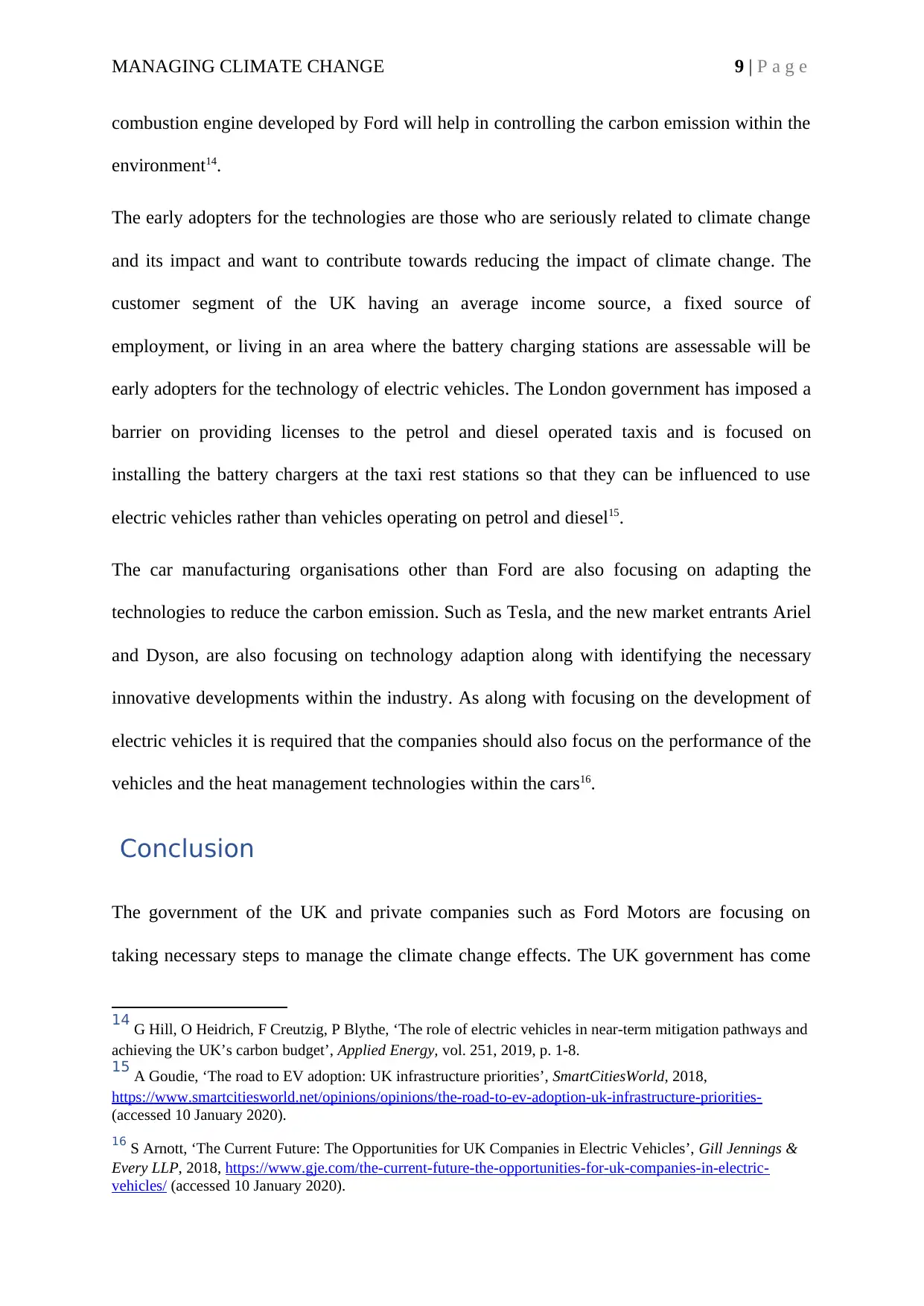
MANAGING CLIMATE CHANGE 9 | P a g e
combustion engine developed by Ford will help in controlling the carbon emission within the
environment14.
The early adopters for the technologies are those who are seriously related to climate change
and its impact and want to contribute towards reducing the impact of climate change. The
customer segment of the UK having an average income source, a fixed source of
employment, or living in an area where the battery charging stations are assessable will be
early adopters for the technology of electric vehicles. The London government has imposed a
barrier on providing licenses to the petrol and diesel operated taxis and is focused on
installing the battery chargers at the taxi rest stations so that they can be influenced to use
electric vehicles rather than vehicles operating on petrol and diesel15.
The car manufacturing organisations other than Ford are also focusing on adapting the
technologies to reduce the carbon emission. Such as Tesla, and the new market entrants Ariel
and Dyson, are also focusing on technology adaption along with identifying the necessary
innovative developments within the industry. As along with focusing on the development of
electric vehicles it is required that the companies should also focus on the performance of the
vehicles and the heat management technologies within the cars16.
Conclusion
The government of the UK and private companies such as Ford Motors are focusing on
taking necessary steps to manage the climate change effects. The UK government has come
14 G Hill, O Heidrich, F Creutzig, P Blythe, ‘The role of electric vehicles in near-term mitigation pathways and
achieving the UK’s carbon budget’, Applied Energy, vol. 251, 2019, p. 1-8.
15 A Goudie, ‘The road to EV adoption: UK infrastructure priorities’, SmartCitiesWorld, 2018,
https://www.smartcitiesworld.net/opinions/opinions/the-road-to-ev-adoption-uk-infrastructure-priorities-
(accessed 10 January 2020).
16 S Arnott, ‘The Current Future: The Opportunities for UK Companies in Electric Vehicles’, Gill Jennings &
Every LLP, 2018, https://www.gje.com/the-current-future-the-opportunities-for-uk-companies-in-electric-
vehicles/ (accessed 10 January 2020).
combustion engine developed by Ford will help in controlling the carbon emission within the
environment14.
The early adopters for the technologies are those who are seriously related to climate change
and its impact and want to contribute towards reducing the impact of climate change. The
customer segment of the UK having an average income source, a fixed source of
employment, or living in an area where the battery charging stations are assessable will be
early adopters for the technology of electric vehicles. The London government has imposed a
barrier on providing licenses to the petrol and diesel operated taxis and is focused on
installing the battery chargers at the taxi rest stations so that they can be influenced to use
electric vehicles rather than vehicles operating on petrol and diesel15.
The car manufacturing organisations other than Ford are also focusing on adapting the
technologies to reduce the carbon emission. Such as Tesla, and the new market entrants Ariel
and Dyson, are also focusing on technology adaption along with identifying the necessary
innovative developments within the industry. As along with focusing on the development of
electric vehicles it is required that the companies should also focus on the performance of the
vehicles and the heat management technologies within the cars16.
Conclusion
The government of the UK and private companies such as Ford Motors are focusing on
taking necessary steps to manage the climate change effects. The UK government has come
14 G Hill, O Heidrich, F Creutzig, P Blythe, ‘The role of electric vehicles in near-term mitigation pathways and
achieving the UK’s carbon budget’, Applied Energy, vol. 251, 2019, p. 1-8.
15 A Goudie, ‘The road to EV adoption: UK infrastructure priorities’, SmartCitiesWorld, 2018,
https://www.smartcitiesworld.net/opinions/opinions/the-road-to-ev-adoption-uk-infrastructure-priorities-
(accessed 10 January 2020).
16 S Arnott, ‘The Current Future: The Opportunities for UK Companies in Electric Vehicles’, Gill Jennings &
Every LLP, 2018, https://www.gje.com/the-current-future-the-opportunities-for-uk-companies-in-electric-
vehicles/ (accessed 10 January 2020).
Secure Best Marks with AI Grader
Need help grading? Try our AI Grader for instant feedback on your assignments.
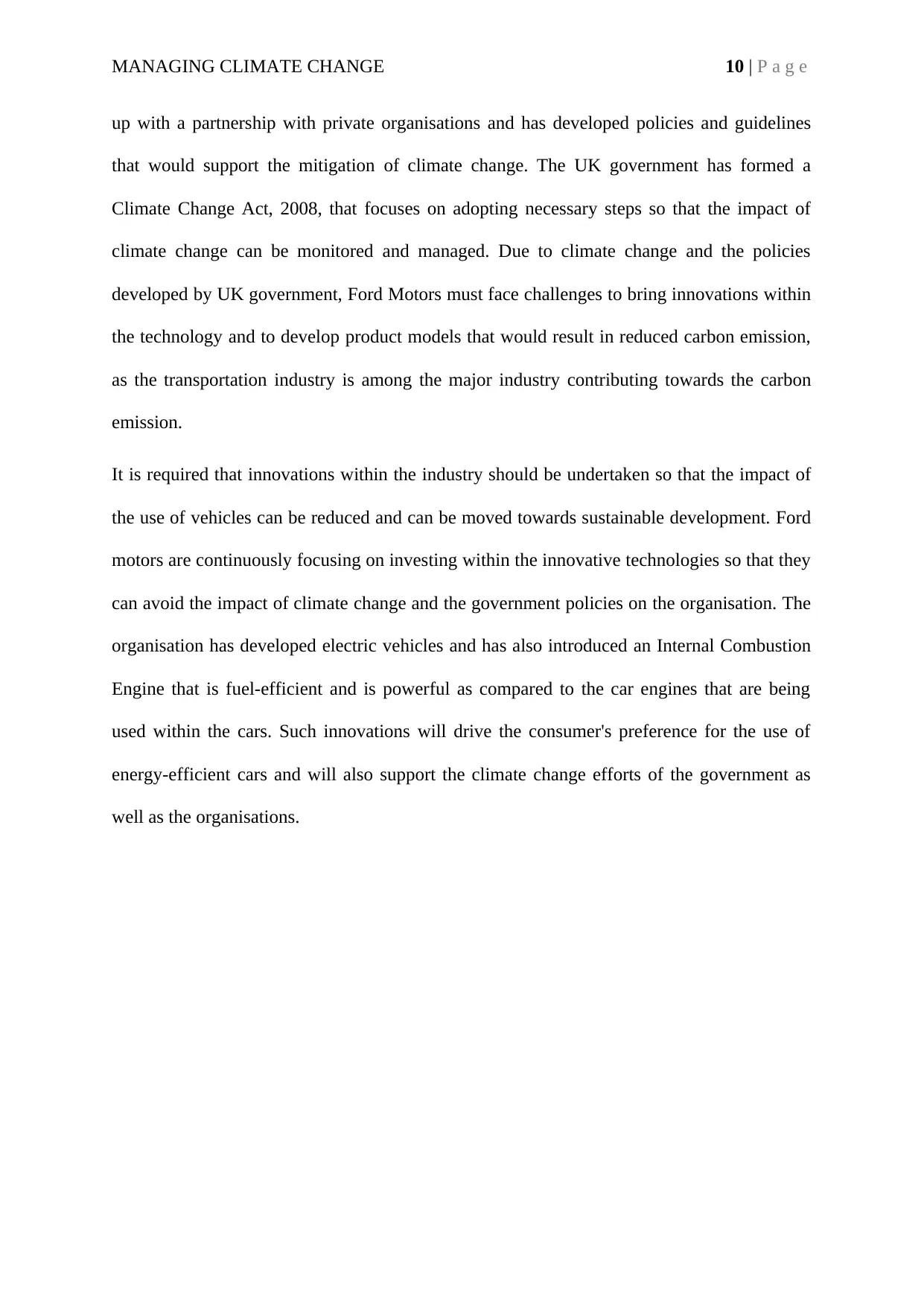
MANAGING CLIMATE CHANGE 10 | P a g e
up with a partnership with private organisations and has developed policies and guidelines
that would support the mitigation of climate change. The UK government has formed a
Climate Change Act, 2008, that focuses on adopting necessary steps so that the impact of
climate change can be monitored and managed. Due to climate change and the policies
developed by UK government, Ford Motors must face challenges to bring innovations within
the technology and to develop product models that would result in reduced carbon emission,
as the transportation industry is among the major industry contributing towards the carbon
emission.
It is required that innovations within the industry should be undertaken so that the impact of
the use of vehicles can be reduced and can be moved towards sustainable development. Ford
motors are continuously focusing on investing within the innovative technologies so that they
can avoid the impact of climate change and the government policies on the organisation. The
organisation has developed electric vehicles and has also introduced an Internal Combustion
Engine that is fuel-efficient and is powerful as compared to the car engines that are being
used within the cars. Such innovations will drive the consumer's preference for the use of
energy-efficient cars and will also support the climate change efforts of the government as
well as the organisations.
up with a partnership with private organisations and has developed policies and guidelines
that would support the mitigation of climate change. The UK government has formed a
Climate Change Act, 2008, that focuses on adopting necessary steps so that the impact of
climate change can be monitored and managed. Due to climate change and the policies
developed by UK government, Ford Motors must face challenges to bring innovations within
the technology and to develop product models that would result in reduced carbon emission,
as the transportation industry is among the major industry contributing towards the carbon
emission.
It is required that innovations within the industry should be undertaken so that the impact of
the use of vehicles can be reduced and can be moved towards sustainable development. Ford
motors are continuously focusing on investing within the innovative technologies so that they
can avoid the impact of climate change and the government policies on the organisation. The
organisation has developed electric vehicles and has also introduced an Internal Combustion
Engine that is fuel-efficient and is powerful as compared to the car engines that are being
used within the cars. Such innovations will drive the consumer's preference for the use of
energy-efficient cars and will also support the climate change efforts of the government as
well as the organisations.
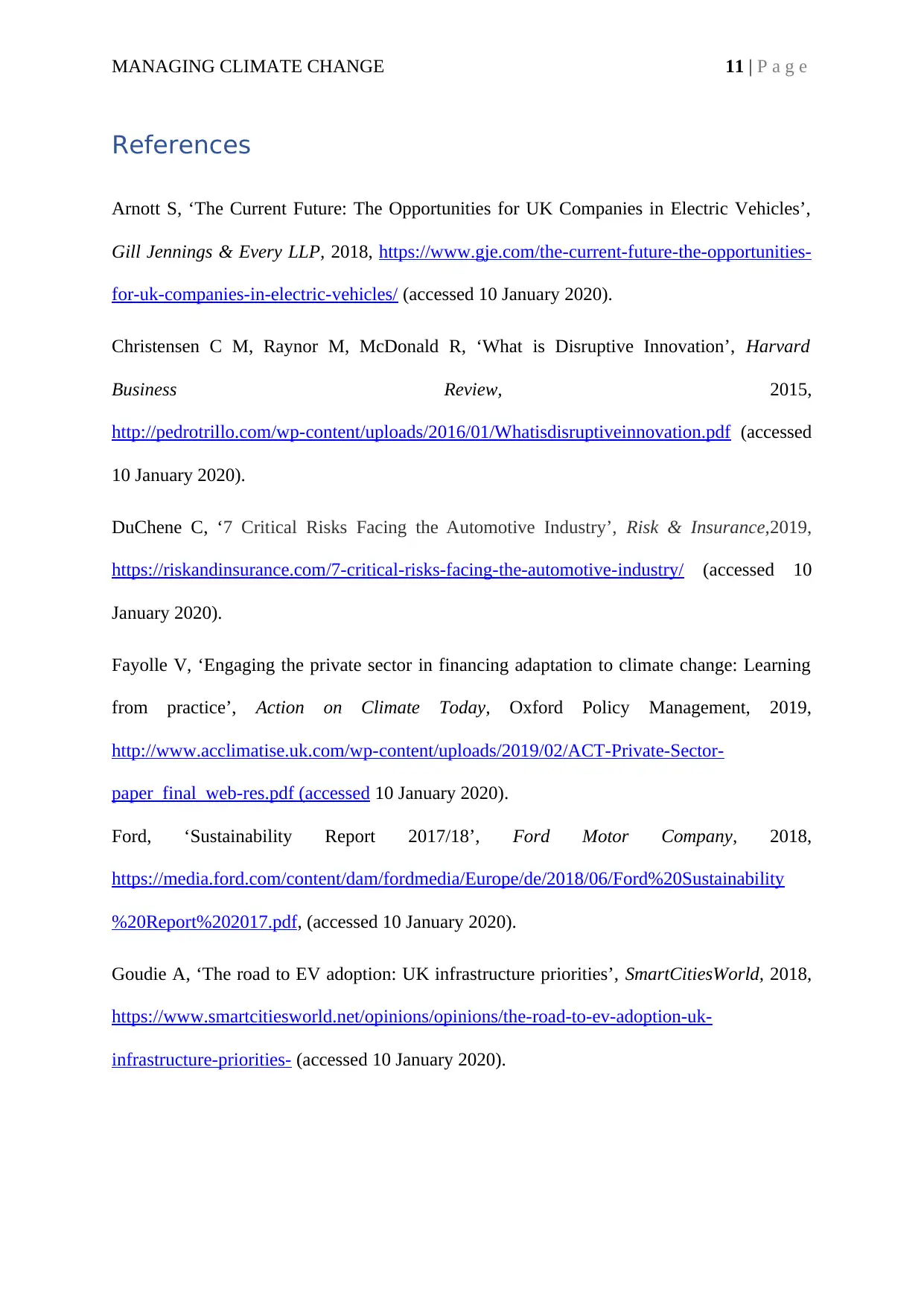
MANAGING CLIMATE CHANGE 11 | P a g e
References
Arnott S, ‘The Current Future: The Opportunities for UK Companies in Electric Vehicles’,
Gill Jennings & Every LLP, 2018, https://www.gje.com/the-current-future-the-opportunities-
for-uk-companies-in-electric-vehicles/ (accessed 10 January 2020).
Christensen C M, Raynor M, McDonald R, ‘What is Disruptive Innovation’, Harvard
Business Review, 2015,
http://pedrotrillo.com/wp-content/uploads/2016/01/Whatisdisruptiveinnovation.pdf (accessed
10 January 2020).
DuChene C, ‘7 Critical Risks Facing the Automotive Industry’, Risk & Insurance,2019,
https://riskandinsurance.com/7-critical-risks-facing-the-automotive-industry/ (accessed 10
January 2020).
Fayolle V, ‘Engaging the private sector in financing adaptation to climate change: Learning
from practice’, Action on Climate Today, Oxford Policy Management, 2019,
http://www.acclimatise.uk.com/wp-content/uploads/2019/02/ACT-Private-Sector-
paper_final_web-res.pdf (accessed 10 January 2020).
Ford, ‘Sustainability Report 2017/18’, Ford Motor Company, 2018,
https://media.ford.com/content/dam/fordmedia/Europe/de/2018/06/Ford%20Sustainability
%20Report%202017.pdf, (accessed 10 January 2020).
Goudie A, ‘The road to EV adoption: UK infrastructure priorities’, SmartCitiesWorld, 2018,
https://www.smartcitiesworld.net/opinions/opinions/the-road-to-ev-adoption-uk-
infrastructure-priorities- (accessed 10 January 2020).
References
Arnott S, ‘The Current Future: The Opportunities for UK Companies in Electric Vehicles’,
Gill Jennings & Every LLP, 2018, https://www.gje.com/the-current-future-the-opportunities-
for-uk-companies-in-electric-vehicles/ (accessed 10 January 2020).
Christensen C M, Raynor M, McDonald R, ‘What is Disruptive Innovation’, Harvard
Business Review, 2015,
http://pedrotrillo.com/wp-content/uploads/2016/01/Whatisdisruptiveinnovation.pdf (accessed
10 January 2020).
DuChene C, ‘7 Critical Risks Facing the Automotive Industry’, Risk & Insurance,2019,
https://riskandinsurance.com/7-critical-risks-facing-the-automotive-industry/ (accessed 10
January 2020).
Fayolle V, ‘Engaging the private sector in financing adaptation to climate change: Learning
from practice’, Action on Climate Today, Oxford Policy Management, 2019,
http://www.acclimatise.uk.com/wp-content/uploads/2019/02/ACT-Private-Sector-
paper_final_web-res.pdf (accessed 10 January 2020).
Ford, ‘Sustainability Report 2017/18’, Ford Motor Company, 2018,
https://media.ford.com/content/dam/fordmedia/Europe/de/2018/06/Ford%20Sustainability
%20Report%202017.pdf, (accessed 10 January 2020).
Goudie A, ‘The road to EV adoption: UK infrastructure priorities’, SmartCitiesWorld, 2018,
https://www.smartcitiesworld.net/opinions/opinions/the-road-to-ev-adoption-uk-
infrastructure-priorities- (accessed 10 January 2020).
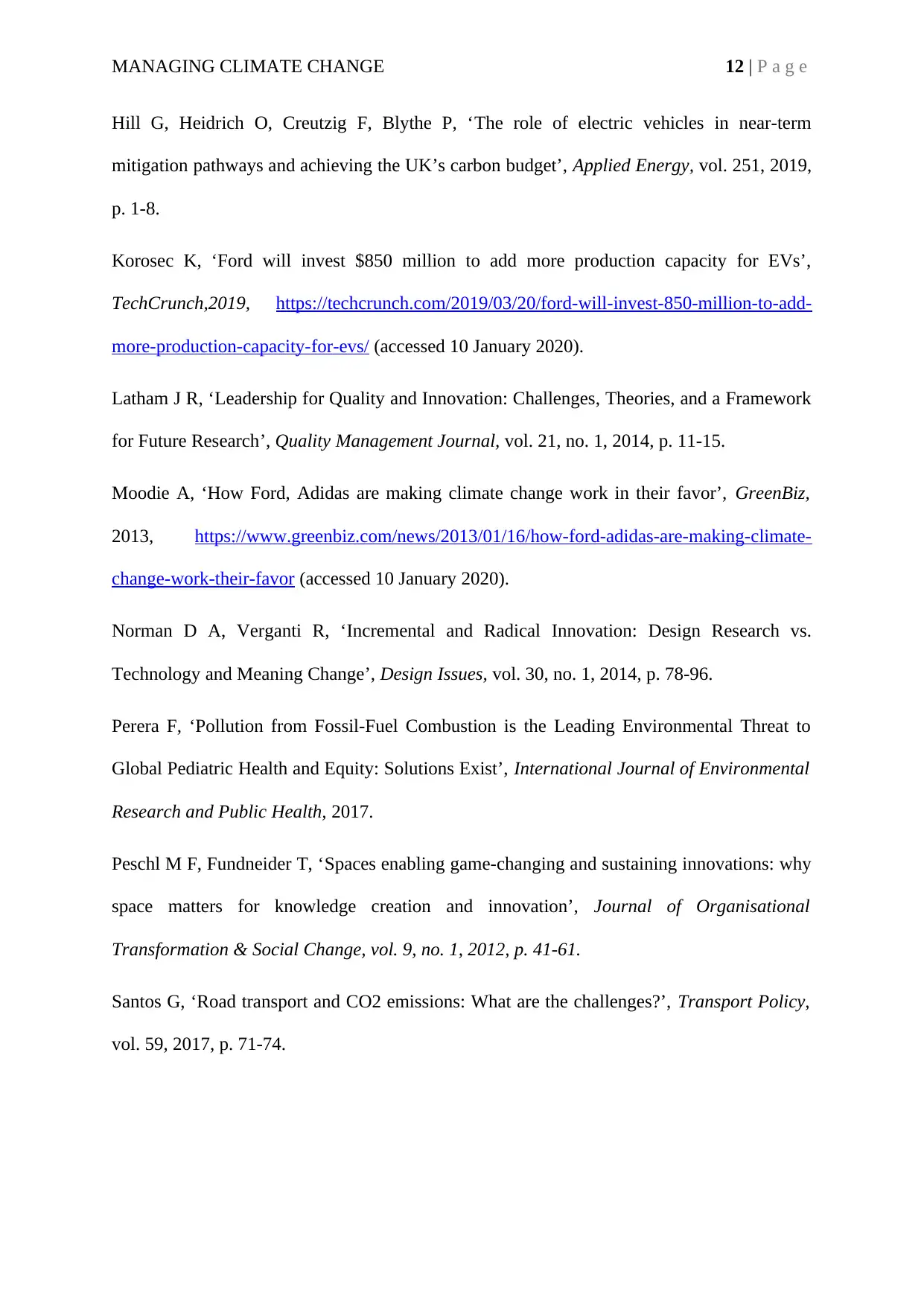
MANAGING CLIMATE CHANGE 12 | P a g e
Hill G, Heidrich O, Creutzig F, Blythe P, ‘The role of electric vehicles in near-term
mitigation pathways and achieving the UK’s carbon budget’, Applied Energy, vol. 251, 2019,
p. 1-8.
Korosec K, ‘Ford will invest $850 million to add more production capacity for EVs’,
TechCrunch,2019, https://techcrunch.com/2019/03/20/ford-will-invest-850-million-to-add-
more-production-capacity-for-evs/ (accessed 10 January 2020).
Latham J R, ‘Leadership for Quality and Innovation: Challenges, Theories, and a Framework
for Future Research’, Quality Management Journal, vol. 21, no. 1, 2014, p. 11-15.
Moodie A, ‘How Ford, Adidas are making climate change work in their favor’, GreenBiz,
2013, https://www.greenbiz.com/news/2013/01/16/how-ford-adidas-are-making-climate-
change-work-their-favor (accessed 10 January 2020).
Norman D A, Verganti R, ‘Incremental and Radical Innovation: Design Research vs.
Technology and Meaning Change’, Design Issues, vol. 30, no. 1, 2014, p. 78-96.
Perera F, ‘Pollution from Fossil-Fuel Combustion is the Leading Environmental Threat to
Global Pediatric Health and Equity: Solutions Exist’, International Journal of Environmental
Research and Public Health, 2017.
Peschl M F, Fundneider T, ‘Spaces enabling game-changing and sustaining innovations: why
space matters for knowledge creation and innovation’, Journal of Organisational
Transformation & Social Change, vol. 9, no. 1, 2012, p. 41-61.
Santos G, ‘Road transport and CO2 emissions: What are the challenges?’, Transport Policy,
vol. 59, 2017, p. 71-74.
Hill G, Heidrich O, Creutzig F, Blythe P, ‘The role of electric vehicles in near-term
mitigation pathways and achieving the UK’s carbon budget’, Applied Energy, vol. 251, 2019,
p. 1-8.
Korosec K, ‘Ford will invest $850 million to add more production capacity for EVs’,
TechCrunch,2019, https://techcrunch.com/2019/03/20/ford-will-invest-850-million-to-add-
more-production-capacity-for-evs/ (accessed 10 January 2020).
Latham J R, ‘Leadership for Quality and Innovation: Challenges, Theories, and a Framework
for Future Research’, Quality Management Journal, vol. 21, no. 1, 2014, p. 11-15.
Moodie A, ‘How Ford, Adidas are making climate change work in their favor’, GreenBiz,
2013, https://www.greenbiz.com/news/2013/01/16/how-ford-adidas-are-making-climate-
change-work-their-favor (accessed 10 January 2020).
Norman D A, Verganti R, ‘Incremental and Radical Innovation: Design Research vs.
Technology and Meaning Change’, Design Issues, vol. 30, no. 1, 2014, p. 78-96.
Perera F, ‘Pollution from Fossil-Fuel Combustion is the Leading Environmental Threat to
Global Pediatric Health and Equity: Solutions Exist’, International Journal of Environmental
Research and Public Health, 2017.
Peschl M F, Fundneider T, ‘Spaces enabling game-changing and sustaining innovations: why
space matters for knowledge creation and innovation’, Journal of Organisational
Transformation & Social Change, vol. 9, no. 1, 2012, p. 41-61.
Santos G, ‘Road transport and CO2 emissions: What are the challenges?’, Transport Policy,
vol. 59, 2017, p. 71-74.
Paraphrase This Document
Need a fresh take? Get an instant paraphrase of this document with our AI Paraphraser

MANAGING CLIMATE CHANGE 13 | P a g e
Watts J, ‘UK should cut vehicles use to zero to hit zero-carbon target, say MPs’, The
Guardian, 2019, theguardian.com/environment/2019/aug/22/uk-must-reduce-personal-
vehicle-ownership-meet-zero-carbon-target-mps-report, (accessed 10 January 2020).
Wilson C, Pettifor H, Cassar E, Kerr L, Wilson M, ‘The potential contribution of disruptive
low-carbon innovations to 1.5 °C climate mitigation’, Energy Efficiency, vol. 12, 2018, p.
423-440.
Watts J, ‘UK should cut vehicles use to zero to hit zero-carbon target, say MPs’, The
Guardian, 2019, theguardian.com/environment/2019/aug/22/uk-must-reduce-personal-
vehicle-ownership-meet-zero-carbon-target-mps-report, (accessed 10 January 2020).
Wilson C, Pettifor H, Cassar E, Kerr L, Wilson M, ‘The potential contribution of disruptive
low-carbon innovations to 1.5 °C climate mitigation’, Energy Efficiency, vol. 12, 2018, p.
423-440.
1 out of 14
Related Documents
Your All-in-One AI-Powered Toolkit for Academic Success.
+13062052269
info@desklib.com
Available 24*7 on WhatsApp / Email
![[object Object]](/_next/static/media/star-bottom.7253800d.svg)
Unlock your academic potential
© 2024 | Zucol Services PVT LTD | All rights reserved.



